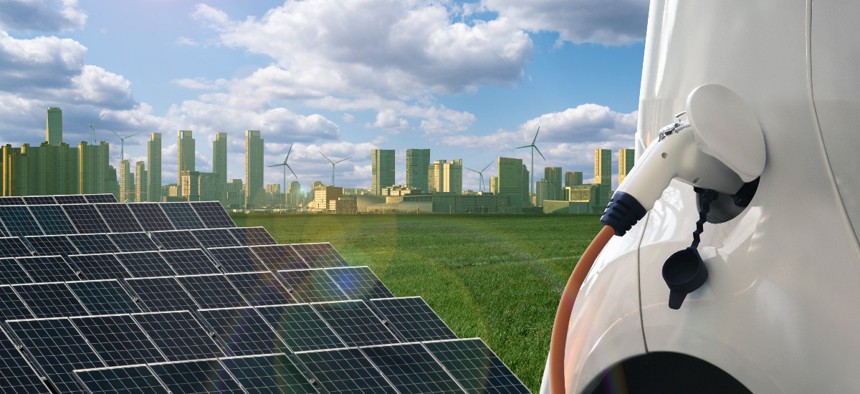EVs, Building Emissions Among Biden’s Sustainable Energy Priorities

Scharfsinn86/Getty Images
Public and private sector leaders discussed the first steps to overhauling the nation’s infrastructure in pursuit of a sustainable future.
The Biden administration launched a new framework to make more clean, electric energy options available for all Americans on a broader scale, part of the administration’s larger goal to achieve nationwide net-zero emissions by 2050.
A slew of government officials and private sector and industry leaders introduced the plan for nationwide electrification rooted in a foundation of clean infrastructure—namely buildings and vehicles—during a summit at the White House yesterday.
“We're gonna have to scale much farther and much faster over an extended period of time if we're gonna get to net zero emissions by 2050, which we have to do in order to have a shot at…avoiding the worst of climate change,” Arati Prabhakar, the director of the White House Office of Science and Technology Policy said in opening remarks.
Officials touted the provisions in the recently-passed Bipartisan Infrastructure Act that are meant to spur the development of a cleaner economy. A key part of the bill is to deploy a stronger transportation ecosystem to promulgate the usage of electric vehicles nationwide.
“We're really thinking about transportation electrification, in terms of a system of systems approach,” Andrew Wishnia, the deputy assistant secretary for climate policy at the Department of Transportation said. “And we're working hand in glove with our colleagues at the Department of Energy to do so, to make sure that we have the technologists and the folks that understand what is needed from an energy perspective, to actually integrate into transportation infrastructure.”
Trisha Miller, the senior director for industry and buildings in the White House’s Climate Policy Office, added that cutting the emissions waste produced by buildings would eliminate 35% of all greenhouse gas emissions––a portion the Department of Energy is targeting with its new Buildings Energy Efficiency Frontiers & Innovation Technologies funding opportunity announcement that will provide $45 million for sustainable innovations in building decarbonization.
“Electrification is one of those key linchpins to being able to eliminate emissions in our nation's buildings and also affordably power those buildings with a clean electric grid,” Miller said.
The U.S. is also studying how artificial intelligence can be incorporated into electric grid optimization, partnering with the European Commission to research how AI can potentially delegate electrical power and build more adaptable grid systems.
Consistent with the Bipartisan Infrastructure law, the administration is also continuing its deployment of electric vehicle charging stations to support a more accessible ecosystem for electric cars, along with tax credits for the purchase of EVs assembled in North America.
“This is our moment all to work together to deploy, deploy, deploy, to get to that clean energy future that we all care about,” Energy Secretary Jennifer Granholm said.






